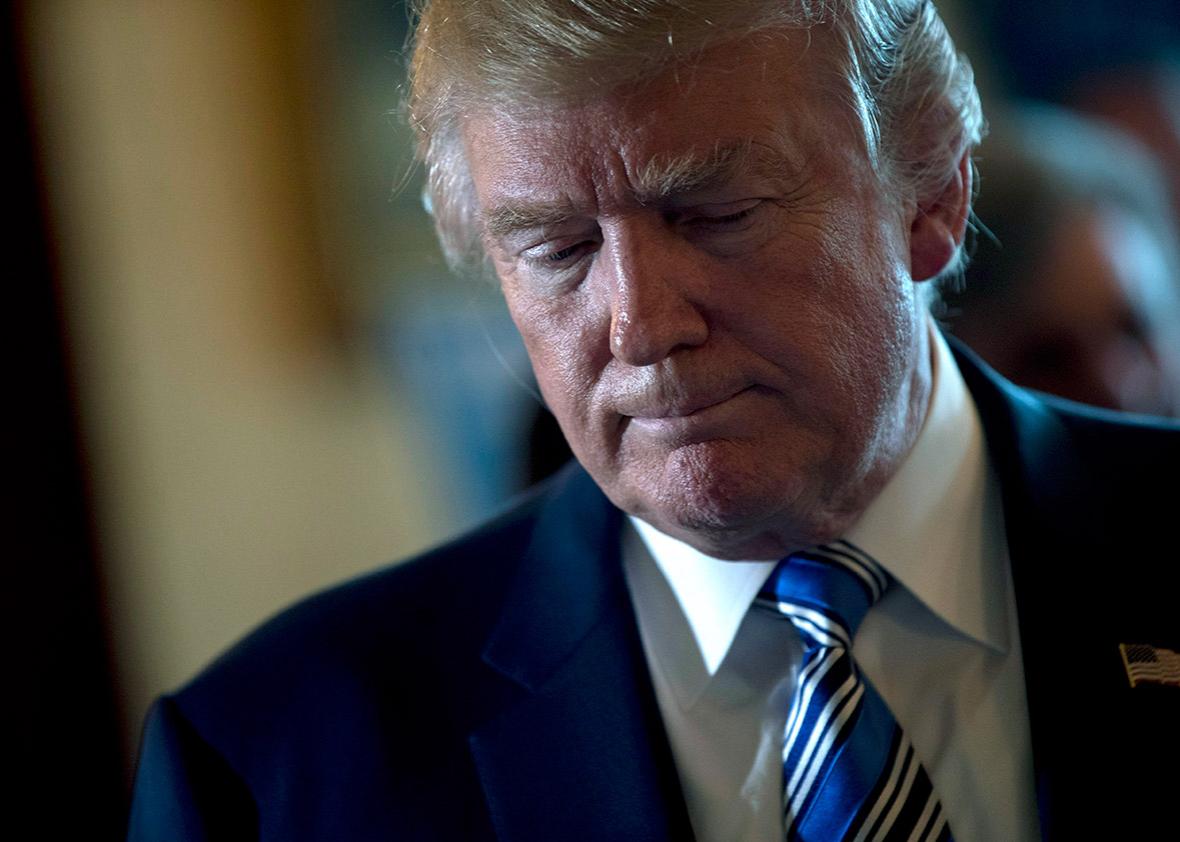Most presidents take a keen interest in their legislative agenda, working with policymakers to craft laws that satisfy their aims and objectives. They have goals, and they want to see them accomplished. But what happens when the president lacks an actual agenda? When his rhetoric is at odds with reality (to say nothing of his political party), and when he’s uninterested in policymaking altogether? What happens is a haphazard, chaotic, and mercenary lawmaking process with little guidance and even less assistance—an environment where failure is more likely than success.
This is the environment that killed the Better Care Reconciliation Act, otherwise known as “Trumpcare.” That’s not to say there weren’t other culprits. There are the ordinary citizens—activists and otherwise—who pressured lawmakers and warned of retaliation if Congress took their benefits. There are the Republicans—governors like John Kasich of Ohio and Brian Sandoval of Nevada—who gave cover to reluctant lawmakers in the Senate. There are the Democrats who formed a unified front against Obamacare “repeal and replace,” regardless of their differences on health policy. And there are the singular figures, like Senate Majority Leader Mitch McConnell, who miscalculated, overestimating their ability to bring colleagues on board for a massive attack on the social safety net.
Want to listen to this article out loud? Hear it on Slate Voice.
But shaping all of this is the neglect of President Trump. As a candidate, Trump promised health care reform, beginning with Obamacare repeal. But as chief executive, while he’s made opaque or even ambivalent demands that a bill be sent to his desk, he’s done almost nothing to advance that promise or defend the policy it inspired. By abdicating that power to influence or even advocate for his agenda on health care, he left the GOP adrift.
The Republican Party’s political success—unified control of the federal government, as well as a majority of governorships and statehouses—belies serious ideological divides. And on health care in particular, it’s clear the long campaign against the Affordable Care Act papered over key differences. Some Obamacare opponents, like Texas Sen. Ted Cruz or Utah Sen. Mike Lee, sought a full-on revolution that would wipe away government’s role in the provision of insurance and medical care. More moderate Republicans wanted something like the status quo, just stingier. And still others were loyal partisans, who would support any package as long as it didn’t jeopardize their standing. McConnell couldn’t keep these groups together—the package that satisfied his right-wing members alienated his moderates, and vice versa—but that doesn’t mean the task was impossible. Presidential leadership might have bridged the gap, bringing reticent senators together under a common partisan banner. A Trump who actually championed this legislation may have kept Republicans—all attuned to his popularity with their base—from fracturing along narrow and self-interested lines.
This isn’t a hypothetical. On Jan. 20, 2010, the Affordable Care Act looked like a lost cause. Massachusetts Republican Scott Brown had won an upset in the previous day’s special election to replace the late Ted Kennedy in the Senate. His message had been simple: If elected, he would vote against Obamacare. Both the House and Senate had passed a bill before the new year, but the two versions had yet to be reconciled when Brown won and deprived the Democrats of a filibuster-proof vote in the Senate. Democrats were shook. President Obama’s chief of staff, Rahm Emanuel, urged his boss to scale down with something narrow and targeted, like expanded care for children. In Congress, moderate Democrats urged leadership to slow the process, with Virginia Sen. Jim Webb pushing Senate leaders to suspend votes on health care legislation. Even liberals like Reps. Barney Frank and Anthony Wiener were convinced that this was the end for health care reform.
But it wasn’t. The president wanted major, comprehensive change, and his allies in Congress—Speaker Nancy Pelosi and Senate Majority Leader Harry Reid—rejected pressure to fold. In the month that followed Brown’s win, Obama worked the ground. He held town halls; he took the argument to Republicans, attending a GOP retreat in Baltimore and highlighting the party’s intransigence, as well as showing his own knowledge of the issue; he held another summit, with members from both parties, that served to calm Democratic nerves and give policymakers and leaders in the House time to sell a revised Senate bill to skeptical lawmakers.
Presidential leadership wasn’t sufficient to pass health care reform, but it was necessary—a key ingredient for success. Obama, along with Pelosi and Reid, kept the Democratic Party together as it made its final push for a bill, tackling criticism, reassuring doubters, and reminding lawmakers of their larger political and ideological commitments. Yes, Obama’s hand was strengthened by the overall cohesiveness of Democrats on health care reform—few Democrats opposed the goal of universal coverage or the use of government to attain it—but it’s also true that under a less committed or involved president, Scott Brown would have spelled the end of comprehensive reform.
The GOP’s seven-year drive to repeal Obamacare was stopped, in part, by an own goal: a Republican president who mouthed the slogan of “repeal and replace” but wasn’t invested in the outcome or interested in the details. Congressional Republicans were forced to chart a course without meaningful White House leadership. They failed.
This problem of leadership won’t end with health care. The GOP now wants to pursue comprehensive tax reform, an area where fewer differences exist among the various factions of the party. To be a Republican, in the modern era, is to support tax cuts. But nothing in politics is automatic. On paper, it should be easy for Republican lawmakers to craft an acceptable package, pass it, and deliver it to Trump’s desk. If difficulties emerge, if Republicans can’t come to consensus and the effort begins to fall apart, then they’ll need guidance—someone to sketch principles and provide a vision of the final outcome. That someone is usually the president.
